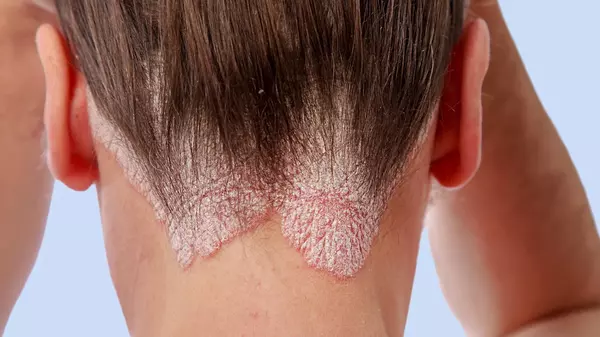Psoriasis is a genetic disease

If you tested your DNA with a personal genomics service like 23andMe, AncestryDNA, FamilyTreeDNA, MyHeritage or another testing company, you can learn more about your risk factors for hundreds of diseases. By clicking the button above ⬆️, you can upload your raw DNA data file and receive a personalized 250-page health report with research links that is the most comprehensive.
It is beneficial to comprehend the genetic impact on the molecular mechanisms and pathways that could trigger psoriasis for the purpose of preventing and treating the ailment. Additionally, this knowledge can aid in pinpointing potential drug targets.
Numerous gene mutations are potentially implicated in the development of psoriasis. Consequently, ongoing research endeavors aim to elucidate the immune system and inflammatory response mechanisms and impact of these genes.
HLA-Cw6 is a gene that is strongly linked to psoriasis, particularly guttate psoriasis and type I early-onset psoriasis.
Compared to other races or ethnicities, the gene is more prevalent among individuals who are white. Those who possess the gene have a higher likelihood of encountering stress, obesity, and strep throat.
Individuals possessing this gene and developing psoriasis are prone to encountering amplified symptoms on their torso, limbs, and legs. Additionally, they have a higher probability of experiencing the Koebner phenomenon.
A mutation in the gene CARD14, which has been identified by trusted researchers, seems to be involved in the onset of psoriasis.
Psoriasis may occur when specific environmental triggers are present alongside changes in this gene, which can cause increased inflammation.
It seems that CARD14 has a part to play in the development of pustular psoriasis.
Psoriasis development is heavily influenced by the PSORS1 locus, which is estimated to be responsible for 50% of all cases due to genetic susceptibility. This locus is situated on chromosome 6 within the major histocompatibility complex (MHC) and plays a crucial role in both immune system response and the encoding of psoriasis-associated skin proteins.
Psoriasis vulgaris is strongly associated with three genes located in this locus, namely:
The HLA-C gene, specifically the HLA-Cw6 variant, is responsible for producing the MHC class 1 protein.
The overexpressed coiled protein is encoded by the gene CCHCR1, specifically the WWC variant.
The overexpressed corneodesmosin protein is encoded by the CDSN gene variant allele 5.
The potential role of interleukin-12 (IL-12) subunit beta (IL-12B) and IL-23R in the development of psoriasis is currently under investigation, as they have been strongly linked to the condition. These interleukin genes are involved in the up-regulation pathway for inflammation-related genes, including tumor necrosis factor-α and nuclear factor KB.
New methods of treating and preventing psoriasis are emerging as scientists gain further insight into the role of genes in the condition.
Follow the link of the selected polymorphism to read a brief description of how the selected polymorphism affects Psoriasis and see a list of existing studies.
SNP polymorphisms related to the topic Psoriasis:
| rs1265159 | There is a 22.6-fold increased risk of psoriasis. |
| rs587777763 | The ZNF750 promoter sequence variant is associated with familial psoriasis. |
| rs3212227 | IL12B gene polymorphism is associated with psoriasis and tuberculosis. |
| rs3213094 | IL12B gene polymorphism is associated with psoriasis and tuberculosis. |
| rs144475004 | A significant (6-fold) increase in the risk of developing psoriasis, at least in Asians. |
| rs281875215 | A rare mutation of the CARD14 gene on chromosome 17 demonstrating autosomal dominantly inherited psoriasis. |
| rs17728338 | A genetic marker for the development or presence of psoriatic arthritis in psoriasis patients. |
| rs27524 | |
| rs176095 | |
| rs240993 | |
| rs280519 | |
| rs458017 | |
| rs465969 | |
| rs479844 | |
| rs495337 | |
| rs593982 | |
| rs610604 | |
| rs702873 | |
| rs734232 | |
| rs842636 | |
| rs878860 | |
| rs887466 | |
| rs1076160 | |
| rs1265181 | |
| rs1444418 | |
| rs2066808 | |
| rs2082412 | |
| rs2164983 | |
| rs2201841 | |
| rs2523454 | |
| rs2546890 | |
| rs3126085 | |
| rs3134792 | |
| rs3803369 | |
| rs3853601 | |
| rs4085613 | |
| rs4112788 | |
| rs4379333 | |
| rs4406273 | |
| rs4649203 | |
| rs4722404 | |
| rs4795067 | |
| rs6661961 | |
| rs6701216 | |
| rs6809854 | |
| rs6887695 | |
| rs7130588 | |
| rs7613051 | |
| rs7927894 | |
| rs7993214 | |
| rs8016947 | |
| rs10484554 | |
| rs10782001 | |
| rs10995251 | |
| rs12191877 | |
| rs12580100 | |
| rs12586317 | |
| rs12634229 | |
| rs12720356 | |
| rs13015714 | |
| rs33980500 | |
| rs281875212 | |
| rs281875213 | |
| rs281875214 | |
| rs387907240 | |
About The Author
Li DaliLi Dali, a National Foundation for Outstanding Youth Fund recipient, is a researcher at the School of Life Sciences in East China Normal University. He earned his PhD in genetics from Hunan Normal University in 2007 and conducted collaborative research at Texas A&M University during his doctoral studies. Li Dali and his team have optimized and innovated gene editing technology, leading to the establishment of a world-class system for constructing gene editing disease models.


